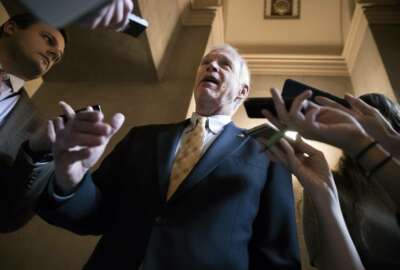

Among the latest bills to move forward in the House and Senate committees on homeland security, government oversight and affairs committees is legislation that...
Among the latest bills to move forward in the House and Senate committees on homeland security, government oversight and affairs committees is legislation that pushes government reorganization plans forward.
In total, the House Oversight and Government Reform Committee marked up 18 bills Thursday, ranging from Secret Service overtime pay to record-keeping for civil rights cold cases. The day before, the Senate Homeland Security and Government Affairs Committee also marked up 18 bills, covering subjects such as cybersecurity and the transitions between presidential administrations.
Following this week’s committee hearings, agencies could also be required to update their websites for improved customer experiences, while the Office of Management and Budget may be required to standardize its reporting requirements for grant recipients. See how some bills are progressing:
The Reforming Government Act of 2018, S 3137, passed the Senate Homeland Security and Government Affairs Committee on Wednesday. It authorizes OMB to prepare a government reorganization plan, and establishes a process for Congress to vote on those proposals. The legislation’s sponsor, Committee Chairman Ron Johnson (R-Wis.) and Federal Affairs and Federal Management Subcommittee Chairman James Lankford (R-Okla.), used a 2012 bill from Sens. Mark Warner (D-Va.) and Joe Lieberman (D-Conn.) as a model for this year’s legislation, Federal News Radio reported.
To better the bill’s chances on the full Senate floor, committee leadership agreed to keep a simple majority vote on the condition that five senators from each party would serve as cosponsors of OMB’s eventual government reorganization plan.
Meanwhile, the House version of the bill, HR 6787, was last referred to the Committee on Oversight and Government Reform on Sept. 12.
The 21st Century Integrated Digital Experience Act (21st Century IDEA), or HR 5759, requires federal agencies to modernize their public websites, services and forms to improve the function of the website.
This includes eliminating duplicate sites, offering an easy search function and utilizing data analytics. Agency leaders would also have to submit a report the most viewed and most sites, as well cost estimates and timelines for digital service modernization. Agencies would have two years to make any paper-based form digital, including accelerating the use of electronic signatures.
During a markup in the House Committee on Oversight and Government Reform, Rep. Steve Russell (R-Okla.) said the U.S. Federal Customer Experience Index gave federal agencies “failing scores” for citizen interactions in 2018.
“21st Century IDEA takes a systematic approach to modernizing websites, services and forms so as not to unduly burden agencies,” he said.
Its Senate companion bill S 3050 passed the Homeland Security and Governmental Affairs on Wednesday and is due for a full body vote.
The Grant Reporting Efficiency and Agreements Transparency (GREAT) Act of 2018, HR 4887, passed in the House on Wednesday and would requires OMB, jointly with the executive department that issues the most federal grant awards, to establish government-wide data standards for information reported by grant recipients. It also requires OMB issue guidance directing federal agencies to apply those standards, and demands the publication of recipient-reported data collected from all agencies on a single public website.
The Senate version of the bill, S 3484, sponsored by James Lankford (R-Okla.), was heard by the Senate Homeland Security and Government Affairs Committee on Wednesday. It mirrors the House version and now heads to the full Senate for a vote.
Copyright © 2025 Federal News Network. All rights reserved. This website is not intended for users located within the European Economic Area.
Amelia Brust is a digital editor at Federal News Network.
Follow @abrustWFED

